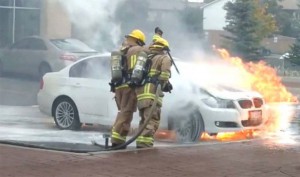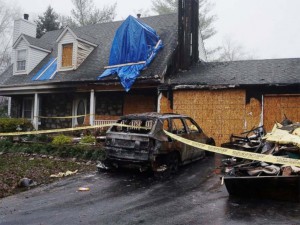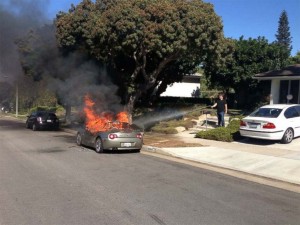Are BMW owners facing a significant risk of vehicle fires? Or has a major network simply pulled a story together using smoke and mirrors?
In a series of reports aired on such high-traffic shows as Good Morning America, World News Tonight and Dateline, ABC News says its reporters have “discovered dozens of incidents in which (BMW) cars caught fire even though owners reported they had parked their cars and turned them off.”
For its part, a statement from BMW contends that after doing its own research on 16 vehicle fires reported by ABC, “We have not seen any pattern related to quality or component failure. Vehicle fires can result from a wide variety of external reasons unrelated to product defect.”
An ABC News report published on its website highlights a number of different fires involving BMW vehicles. That includes one owned by 55-year-old Bill Macko, of Olney, Maryland. His wife had just parked their 2008 BMW X5 in the family garage when she noticed what she described as a strange smell. Macko walked down to the garage, only to hear what he described as a “snap, crackle, pop,” before the ute burst into flames.
(BMW upping production to 3M units by 2020. Click Here for the story.)
“You cannot do a thing about it,” Macko said about the fire that nearly destroyed their home.
Another incident reported by ABC involved a fire in Mamaroneck, a suburb of New York City, involving a 2003 BMW that “had been parked for at least four, three or four days,” the community’s Fire Chief Tracey Schmaling told a reporter for the network’s affiliate WABC-TV.
The ABC News report highlighted other incidents in Los Angeles, Raleigh, Chicago, San Francisco and even South Korea. In all, it said it “found more than 40 fires occurring in parked cars across the country in the last five years.”
A spokesman for BMW noted that the automaker has issued recalls over the years “for problems that could cause fires.” But none of the vehicles involved in the fires reported by ABC were found to be subject to such recalls, both the automaker and the TV network agreed.
That is about the only point they do agree on.
BMW’s top U.S. spokesman, Tom Plucinsky, said that ABC provided the automaker with Vehicle Identification Numbers, or VINs, for 16 of the vehicles it referred to. BMW was able to study the paperwork on those models, but was only able to conduct physical inspections on three. In at least one case that the ABC reports have focused on, Plucinsky said, there is strong evidence that the fire was actually triggered by an “external ignition source.”
“The ignition of the car was started by something outside the car,” he told TheDetroitBureau.com. “We have told this to the customer and they won’t accept it. Their response was that they went to ABC News.”
The BMW representative also pointed out that there is no consistency to the products involved in the fires. The list cited by ABC includes small cars and big SUVs, new models and old, with some having clocked as much as 230,000 miles on their odometers.
The automaker took the unusual step of issuing a media alert immediately before the ABC reports began to air, with the e-mail subject line: “Sensationalistic ABC Reports on BMWs Expected.” In its statement, BMW insisted that fires involving the 4.9 million vehicles it currently has on U.S. roads are “very rare.”
Automotive fires are relatively rare but still add up. According to the National Fire Protection Association, an estimated average of 152,300 occurred each year between 2006 and 2010, or 10% of total reported U.S. fires. “They caused an average 209 civilian deaths, 764 civilian injuries and $536 million in direct property damage.”
(Click Here to see more about BMW’s biggest product blitz in history.)
The NFPA blames mechanical or electrical failures or malfunctions for “roughly two-thirds” of automobile fires, collisions and other crashes for just 4%. The organization does not list the numbers caused by outside sources. In some cases, however, fires have been known to occur when a vehicle parks atop leaves or other combustible materials that are then ignited by a hot catalytic converter.
According to ABC, it brought its findings to the attention of the National Highway Traffic Safety Administration, which found no evidence of a safety defect. NHTSA did advise drivers to “report potential safety issues to the agency, including strange and unexplainable incidents involving their vehicles.”
Government regulators, the network noted, have begun an investigation after hearing reports of “a series of car fires involving BMWs.”
The network also noted that New Jersey attorney Joseph Santoli, “who has sued BMW in the past,” is exploring legal options for several BMW owners who have experienced fires.
For its part, the automaker insists there is no discernable pattern that would reflect a potential safety defect.
Can the network’s report be isolating a problem of trouble previously ignored? It wouldn’t be the first time a TV broadcaster has pointed to a potentially deadly safety issue, though there have also been a few embarrassing failures. CBS News ultimately had to apologize for reporting on alleged unintended acceleration problems involving the Audi 5000. And NBC News was shown to have rigged a test to make it look like a Chevrolet pickup could catch fire in a side-impact crash.
(Major refresh coming for BMW 4-Series. Click Here for the story.)
For its part, ABC has not come up with an explanation for why it claims BMW vehicles are catching fire. And with NHTSA saying it sees no safety defect, it remains unclear if there really is a safety issue that has, until now, gone unreported.




“ABC has not come up with an explanation for why it claims BMW vehicles are catching fire.”
It is not ABC’s responsibility to determine the cause of the fires. If this were Ford or GM, congressional hearing would have already begun.